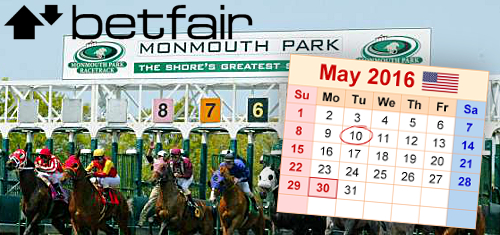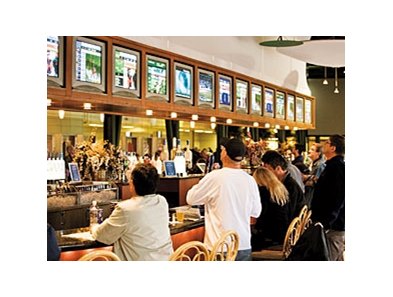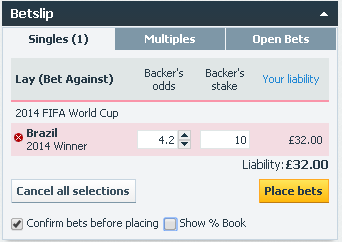What Is Exchange Wagering
What is exchange betting? Betting on the Smarkets exchange offers you an exciting and fairer way to bet on sports, politics and other events. The fairness of the Smarkets exchange is that. Betting exchanges can be a tad confusing to start with, so don’t worry if things seem a little unclear at this stage. Being able to place lay bets at a betting exchange is the key to the entire matched betting process, so it’s definitely a concept that’s worth getting your head around.
- Fanvest Wagering Exchange
- What Is Exchange Wagering
- Exchange Wagering
- Exchange Wagering New Jersey
- What Is Exchange Betting
- What are the benefits of an Ad Exchange for Advertisers and Publishers?
Ad Exchanges are digital marketplaces where publishers and advertisers come together to trade digital ad inventory such as a display, native, video, mobile and in-app. Buying and selling happen in real-time auctions, empowered by RTB (real-time bidding) technology. The Ad Exchange is an auction mediation mechanism that does not serve either the buyer or the seller side; it is an autonomous platform that facilitates programmatic ad buying.
Who uses Ad Exchanges?
If you are about to venture into the world of investments, you should know that the vast majority of stock transactions are carried out in places known as stock exchanges, but. A betting exchange is an online tool that allows gamblers to bet directly against each other, as opposed to betting against traditional bookmakers. As sports betting is essentially a game of opinions, betting exchanges allow their customers to set their own odds on the outcomes in any given sporting event.
Owners of websites, online magazines or blogs known as “publishers” use SSP (supply-side platform) to plug into the Ad Exchange and make their digital advertising space available for buyers (more information about SSPs and what it is you can read here - Meet SSP: The Very Best Friend of a Digital Publisher). Independent marketers, ad agencies and Ad Networks are known as “advertisers” use DSP (demand-side platform) to connect to an Ad Exchange in order to purchase advertising space (additional information explanation of DSP - click here). Ad Networks also buy ad space from Ad Exchanges, mark it up and sell for profit. ATDs (Agency Trading Desk) use the Ad Exchange to buy large advertising inventories and sell wholesale to individual advertisers.
What are the benefits of an Ad Exchange for Advertisers and Publishers?
Programmatic ad buying proceeds via the use of software and algorithms, allowing publishers to get the best price for their ad space and advertisers to reach out target audience in the right time and context.
Ad Exchange provides various control mechanisms for the publisher:

1) Setting minimum CPMs for inventory units; filtering and blocking ads with sensitive content or ads from competitors;
2) Defining what types of ads would appear on the web page by choosing ad formats and ad style;
3) Building customized combinations of fonts, colors and corner style and applying them to multiple display ads at a time;
4) Choosing the location of ads on a web page.
Advertisers benefit from the Ad Exchange by getting the opportunity to:
1) Set budget pacing options; choose targeting options, bidding capabilities, behavioral profiling, price settings;
2) Blacklist certain websites and audiences;
3) Put limits on the number of times the same ads appears to the same user;
4) Retarget across multiple Ad Exchanges.
How does Ad Exchange Work?
- A publisher makes its inventory available on the Ad Exchange through SSP. The publisher provides full details on the inventory such as page location, URL, audience, topics and so forth.
- When the user enters the publisher’s website or mobile app, an ad impression automatically appears on the auction. The data about the user is collected, sent to the publisher’s server and then transferred to the Ad Exchange.
- Then, the Ad Exchange sends a bid request to DSPs and Ad Networks. Each DSP would inspect the bid request and all information related to it (demographics, user ID, geolocation, frequency capping, day parting, and other targeting options). After inspection, the platform would decide whether the impression is of interest to the advertiser. If so, DSP would send a reply to the Ad Exchange with a maximum bid amount and the location of the advertising copy that is to be placed onto the available ad space.
- The Ad Exchange reviews advertisers who bid on the impression. The Ad Exchange eliminates the advertisers who do not meet the publisher's requirements. For instance, the ad slot is available on the Chinese website and a publisher sets a restriction to allow Chinese-language ads only. Therefore, the Ad Exchange would eliminate all non-Chinese ads from the auction.
- Having gathered all data, Ad Exchange analyzes bids and sells the impression to the highest bidder.
- The winning advertising copy appears on the publisher website in front of the user. The internet user is not aware of the RTB process since auctions last less than a few milliseconds, just about the time it takes a webpage to load. The process does not interfere with user experience and does not decrease page loading speed.


What are the different types of Ad Exchanges?

Open Ad Exchange/ Public Marketplace/ Open Auction is an open digital marketplace with extensive inventory from multiple publishers available for all buyers. An Open Ad Exchange offers a broad list of publishers; However, buyers do not have the detailed information about the publisher, as it is the case with private marketplace. Buyers, looking for wider publicity choose an open Ad Exchange. With more than 70 billion impressions per day flowing through open Ad Exchanges, there is a growing concern among advertisers and publishers regarding digital ad fraud (read here about Inventory fraud: detecting and preventing), malware and bot activity. For this reason, private marketplaces are getting more popular as they are considered safer and more transparent.
Private Ad Exchange/Private Marketplace (PMP) is a closed platform that enables the publisher to control which buyers can make bids, at what price and under what conditions. Each private Ad Exchange is run by an individual publisher that personally invites each buyer to the platform. The publisher might give permission to make deals with a few regular buyers, advertising client or an agency. The publisher might also block Ad Networks and other third-party members from giving access to its pool of impressions. Private Ad Exchanges allow brands and publishers to set up direct relationships with brands and agencies; hence, negotiations with buyers might be more time-consuming in comparison to Open Ad Exchanges. The inventory available on private Ad Exchanges is considered “premium” compared to that, ordered in open marketplaces.
Preferred Deal is an option for a publisher to sell digital ad inventory at a negotiated fixed price for preferred advertisers. Preferred Deals gives the publisher a stable revenue stream through the controlled transaction system. Advertisers benefit from stable CPM prices and having access to premium, exclusive inventory.
What is the Difference between Ad Exchange and Ad Network?
Although the Ad Exchange and the Ad Network seem to be performing the same roles, these platforms are two separate concepts and must not be confused. Ad Networks collect digital ad inventory from a list of publisher sites or buy ad impressions in bulk from Ad Exchanges, sort them through and then resell them to advertisers. Since advertisers do not have enough time for filtering available inventory, Ad Networks do it for them.
Fanvest Wagering Exchange
Ad Networks group inventory according to specific parameters such as audience segments (demographics, geography, language, interests, online behavior, etc.), pricing or scale. Some Ad Networks are focused on coverage and quantity, while others specialize in the quality of ad slots they offer.
Ad Exchange is an open pool of impressions whereas Ad network is a closed group of privately traded ads. Ad Exchanges offer more transparency to buyers since buyers can see exactly how much each impression is being sold for. In contrast, Ad Networks act as the intermediary and sometimes charge buyers with inflating prices. To get more understanding about how everything works together, check out our article on connecting the dots of the Programmatic Ecosystem.
To learn more about SmartyAds new products contact us and explore our latest solutions for advertisers and publishers!
Irina Kovalenko, CMO of SmartyAds
February 2018
A betting exchange is an online platform in which punters who want to back a particular outcome are matched with others who are happy to lay them the bet.
If you want to place “lay bets”, you can’t do this with a traditional bookmaker. You can only lay on a betting exchange which is effectively a free marketplace for trading bets.
What does a betting exchange look like?
The interface of a betting exchange can look fairly daunting and quite different from a bookmaker’s online sportsbook. But have no fear.
In this market, the left-hand columns of numbers under ‘Back all’ are for punters who want to back Man Utd, Leicester and the draw respectively. The right-hand side is for the layers – those who want to be bet against either Man Utd, Leicester or the draw.
The bold numbers in the boxes represent the current odds available. You can only select the biggest odds available as the exchange wants to get you matched at the biggest price.
For a home win for Man Utd, £217 is currently available to match at 1.89, or nearly 10/11 in fractional odds. Once that £217 has been collectively matched by punters, £854 will be available at 1.88.
On the betting exchange, odds are always represented as decimals. In some ways, this format is easier to envisage potential winnings. £10 at 1.89 would derive £8.90 profit (10 x 1.89) in addition to your £10 stake.
How do I lay bets on a betting exchange?
To lay on a betting exchange, simply hit the lay button for the selection you want to bet against in your chosen market.
As you can see, if your £10 lay bet Cloak Of Spirits wins this race, your liability is £22. You will also lose your £10 lay stake, so the total payout is £32.
Because you’re acting the role of bookmaker, if any of the other runners do the business your winnings will be £10, the equivalent of your original stake. The shorter the odds of the selection you lay, the smaller your liability.
The betting exchange helpfully outlines all the potential results when you’re in the process of placing your bet. You can find these figures underneath each selection in a market, here on the left-hand side of the page.
Betting exchanges v bookmakers
As well as the chance to lay bets, betting exchanges charge commission on winning bets. Think of this as their reward for allowing backers and layers to bet against each other. Bookmakers do not charge commission, but theoretically it’s harder for punters to succeed with them over betting exchanges.
Why? Because traditional bookmakers lock in a theoretical profit to each individual market or ‘book’, known as an overround.
The probability of all the odds in a particular market – let’s just say a horse race of eight runners – should total 100%. After all, one of the eight runners will surely be declared the winner. But the total probability of the combined odds offered by a bookmaker would likely amount to 112%, or an overround of 12%.
What Is Exchange Wagering
Betting exchanges do not have a built-in overround. Their ‘books’ – created by the ebb and flow of money between backers and layers – total much closer to 100%.
Exchange Wagering
What’s wrong with traditional bookmakers?
Exchange Wagering New Jersey

What Is Exchange Betting
Theoretically, punters have a better chance and the overall odds are bigger on the betting exchange model. This is especially true among the bigger-priced contenders in a market.
Ultimately, the unique selling point of a betting exchange is being able to lay. This opens up the opportunity for more betting behaviours for potential profit, including arbing, trading and matched betting.
Why is betconnect different from other betting exchanges?
We offer a wide range of different markets across 14 of the world’s best sports and betting mediums. The difference with betconnect is that our Punters do not have to actively seek out markets.
Instead, we send them Bet Requests via our Pros – our backers looking to get on. Our Punters have a much better idea who they are betting against They are essentially receiving betting intelligence from well-informed betting brains with every Bet Request.
With no need to trawl through an abundance of markets like other betting exchanges and on a clean, easy-to-use and transparent interface, betconnect is the world’s social betting network that charges 0% commission for our Punters. Get involved!